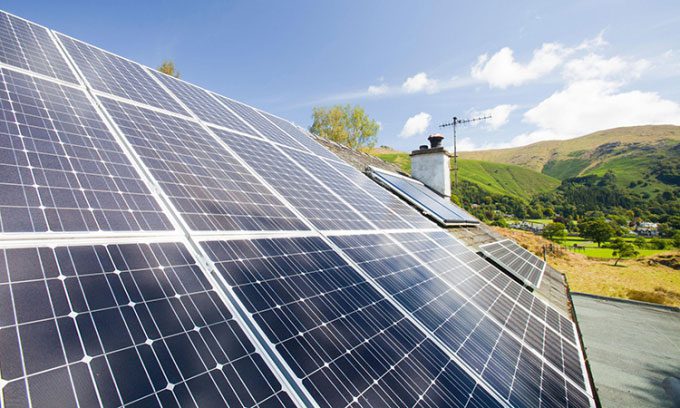The hot weather in the UK is generating a lot of solar power, but it is not enough to set a record as temperature is not the main factor for effective production.
The trade association Solar Energy UK reported that in recent days, about 10% of the UK’s electricity has come from solar power, BBC reported on July 19.

Solar panels on a rooftop in Lake District, UK. (Photo: Alamy)
Terence Eden, a resident of South London, has equipped his home with solar panels and storage batteries. Eden stated that his system is generating more energy than he uses, allowing him to sell the surplus back to the grid. “On a day like yesterday, we produced 20 kWh of electricity, used 8, stored 2, and sold back 10 to the grid,” he told BBC on July 19.
Eden estimates this generates about £1.70 for him. He noted that his solar panels perform best around the summer solstice, when there is maximum daylight, but they are still useful even in winter. They only stop working when covered in snow, according to Eden.
This week, the UK recorded its highest daytime and nighttime temperatures ever, while issuing heat warnings for much of the country. However, in solar power generation, sunlight (irradiance) is more important than heat.
“In fact, heat diminishes the efficiency of solar panels. Therefore, it is unlikely that new records will be set,” said Chris Hewett, CEO of Solar Energy UK.
“Due to the balance between sunlight and temperature, the record for the highest electricity output in half an hour is always in April or May, when it is sunny but relatively cool. The amount of electricity produced from solar power has been very high over the past week. But I think it is unlikely that a new record for electricity output will be established,” commented Jamie Taylor, a senior data scientist at the University of Sheffield.
The record for daily solar electricity production in the UK is 80.6 GWh, set on May 29, 2020, according to Taylor. Experts estimate that solar systems produced about 64 GWh of electricity on July 18.





















































